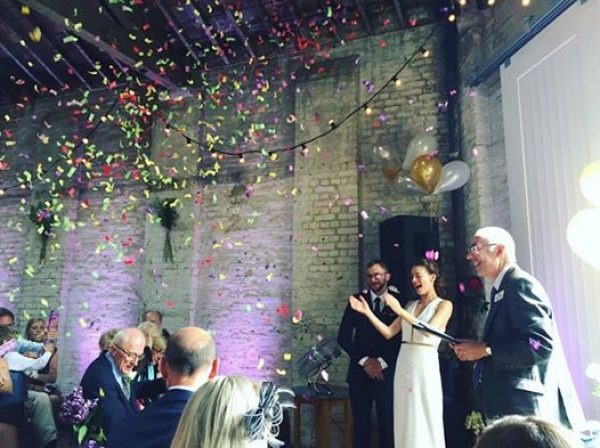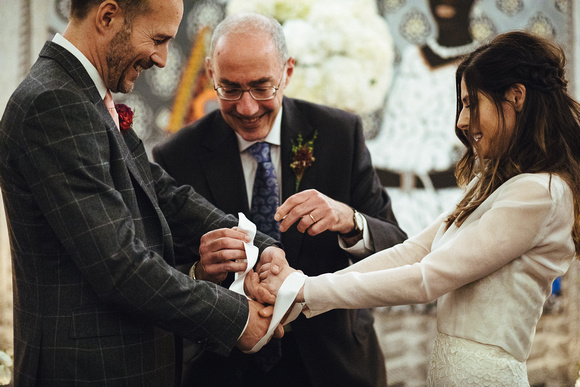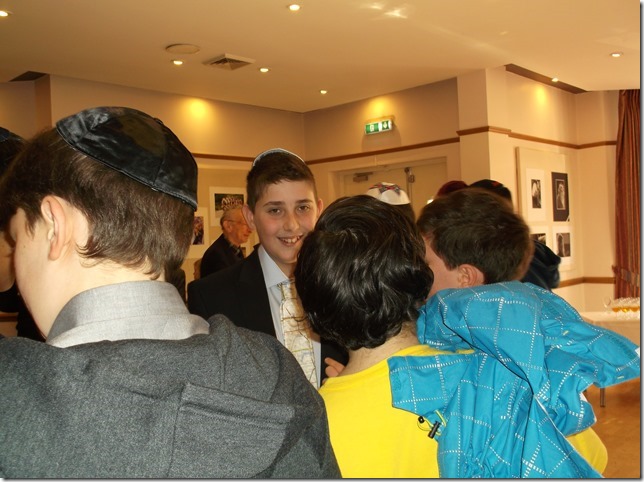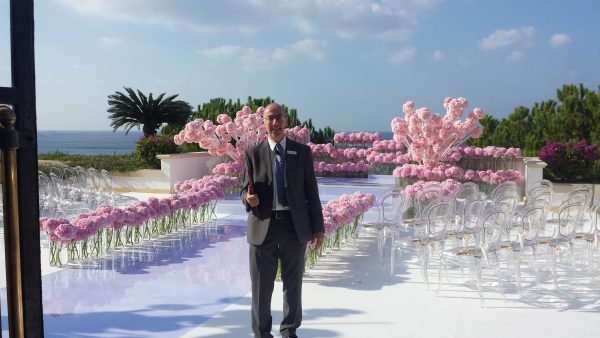
by Michael | Apr 11, 2018 | Blog
For (nearly) 250 years the US has existed independently of the United Kingdom. That time has witnessed many changes. Language is one example (“faucet” for “tap”, “diaper” for “nappy”, “sidewalk” for “pavement” – you name it, the list seems endless).
Bridal traditions have also changed.
Language
In some cases with these traditions, it’s only a matter of language too. So the “bachelorette party” is better known in the UK as “hen party” and the “bachelor party” as “stag do”. Furthermore, the “Maid of Honour” is often referred to as “Chief Bridesmaid” over here, and “Groomsmen” as “Ushers”. As a “Civil Celebrant” myself, I have had to become aware of the American version of my job-title, which is “Officiant”.
Conventions
Other (non-verbal) traditions include no bridal showers in the UK (although they are beginning to catch on, I think).
Invitations can be different. In the UK there may be two types: one, attend everything; the other, just come for the reception. In the US, the invitation will include ceremony and reception.
The Ceremony
One significant difference is the processional. At the start, in the UK the bride walks down the aisle followed by her bridesmaids; in the US the bridesmaids precede the bride.
There also tend to be more bridesmaids in the US (on average 5) compared to those in the UK (3).
For the processional, US bridesmaids and groomsmen pair off and enter together; in the UK the ushers are often waiting with the groom.
Often in the UK (but almost never in my ceremonies!) the groom faces the celebrant with his back to the guests; in the US he will face the guests as the bride comes down the aisle.
Another difference at the ceremony is the wedding party. In the US, they stand with the bride and groom during the ceremony, whereas in the UK they sit with the guests.
Post-ceremony
After the ceremony, there is likely to be a bouquet or garter toss in the US, but not over here. Only in the US can you expect a dance for the parents (formally announced).
Finally, the Americans will include toasts by the bride’s father, maid of honour and Best Man, whereas over here there are normally major speeches by the father of the bride, the groom and the Best Man (and, nowadays, sometimes, by the bride).
Although we have so much still in common with our American “cousins”, a lot, as we can see when we look at the bridal traditions, is different too.
Variety is, as they say, the spice of life.

by Michael | Apr 9, 2018 | Blog
I deal in unions. Not trade unions, but matrimonial ones. As regular readers will know, I compile and conduct ceremonies, many of which are weddings.
As part of my work, I therefore find myself at different venues all the time. What a variety I have experienced! Some have been outdoors: Stonehenge was so memorable, but, in a different way, so were a canal-side glade, and a barn wedding in a rainstorm. Indoors, I have conducted a Vow Renewal for a couple plus photographer (no guests) in a lovely private hotel room; then there was a wedding at the Savoy with 200 guests…
I’ve also viewed some venues, so as to be able to make recommendations to clients.
I was invited to Chelsea Football Club because, unbeknown to me, that is a wedding venue. Perhaps I would be able to partner with them?
One problem that immediately arose is that I am a Tottenham supporter! Would I want to make a union with such a rival? It is true that I compiled and conducted a funeral service for an avid Chelsea fan a few years back. I even suggested the Chelsea anthem “Blue is the Colour” for the ceremony, and this was agreed upon. Mind you, leading the actual singing was a step too far!
However, the recent result when Spurs travelled to Chelsea (in my wake) emboldened me, and I have decided to publicise my allegiances!

What I have to say, though, is that the venue is stunning. There is a whole range of rooms of differing types available. I hope my amateur photos give an idea of what I mean. If you are a dyed-in-the-wool Chelsea supporter, I can’t emphasise how much you are likely to enjoy having your celebration there.
And they know what they’re doing. The wedding organiser I met couldn’t have been pleasanter and more on-the-ball (if you’ll forgive the pun!).

Do pay them a visit and see for yourself.
For other suggestions in the Greater London area, do please contact me.

Of course, I’m waiting till White Hart Lane is finished. I expect an invitation!

by Michael | Apr 3, 2018 | Blog
It may sound a bit bizarre that I am writing about humour at weddings. However, ceremonies like these don’t have to be solemn all the time. That’s not to say that there aren’t parts that probably should be.
Apart from making the atmosphere lighter, humour can cause the ceremony to be more personal and memorable. (Incidentally, I’m referring to intentional humour here!)
Of course, the celebrant can contribute with touches of wit (as long as he accepts that the ceremony is not a stand-up routine!). But the point is that the whole event is actually about the couple up there with him.
One area where the bride and groom can show their individuality and humour is the vows. Instead of – or in addition to – traditional vows, the couple can write their own.
These are public declarations, so should be primarily serious and sincere. However, the dose can be lightened with a spot of humour. This will help reveal the personality of the pair.
You don’t have to write masses (in fact, less is good). Quite often, the vows can be promises. Some will say what you will do; others what you won’t do. Season with a little humour.
What about a few examples of humour?
Groom: I promise not to leave my empty beer cans in the lounge overnight. I promise not to go out to the pub every night. Not every night.
Bride: I promise to learn to cook at least two different dishes by the end of next year.
Groom: I promise not to leave my shoes all over the hallway. I even promise to take my shoes off when I come in …
Bride: I promise to wait until after the wedding day to tell you what I think of those shoes.
Groom: I promise to ask a passer-by the way, if I get lost.
Bride: I promise we won’t see my parents excessively. Of course, they may visit us the weekend we’re not with them.
Groom: I promise not to clean my football boots in front of the television. I promise not to keep the take-away in business single-handed.
Bride: I promise not to cancel the Sky Sports subscription without at least a day’s warning.
Groom: I promise to allow you to go shopping at least once when we’re on holiday.
Bride: I promise to make you proud of me by buying a lovely new handbag every month or two.
Groom: I promise to look interested when you tell me about your day.
Bride: I promise to care for you tenderly if your illness is neither man-flu nor hangover-related.
You can work individually or together when writing your vows. The effects may be fascinating!
So don’t go thinking that humour is out of place at a major ceremony. It is if the humour is insulting, offensive or derogatory. Otherwise, be prepared to use it judiciously, and your ceremony may well stand out even more.
For more advice, please contact Michael
Photo: www.lyndseygoddard.com

by Michael | Mar 27, 2018 | Blog
What do you think about child-free weddings?
Wow! I bet there are some polarised responses to that question!
Child-free weddings will certainly be a matter of opinion. As a celebrant, I’ve had good and bad experiences where children have been concerned. Without getting implicated in controversy, let me make a few observations.
Young children do have the potential to turn solemn moments into a nightmare. Even entire ceremonies. Parents suffer, of course, but so do those around them. With the best will in the world, children ‘s behaviour cannot be taken for granted, whether or not they are ‘on show’.
Naturally, the age of the child will enter into the equation, but here are some tips to make it easier for child, parent and other guests.
Toddlers
It’s good if your child can maintain his natural rhythms. If he likes to sleep at a certain time, make it as easy as possible for him to sleep then, even if it means you have to miss some of the post-ceremony socialising and feasting. If you’re lucky, there may be a quiet room you’ll be able to use.
Formal clothes may be uncomfortable for the child, and she may make that discomfort obvious!
You don’t have to take on the whole burden yourself. Your partner can share in the duties! Or you might rope in relatives or close friends. If a parent is participating in the ceremony, then it’s essential that someone close to the child or baby looks after her. It’s also reassuring for the child to be surrounded (in a crowd) by familiar faces, so have such people seated close by.
It’s probably best to take your child out of the main event, if he is showing signs of strain or fatigue.
Don’t expect to be able to stay till the wee hours. Your child will almost certainly have other ideas!
Youngsters
If the child is older, you may be able to prepare him beforehand. Bribery is permissible! Tempt him with the prospect of a good buffet, if he’s good. Consider offering a book, some paper and crayons or even (muted!) a hand-held electronic device.
Few people will complain if your little one is playing quietly with some toys.
If you are relaxed, you are more likely to find that your child relaxes too, and the dreaded tantrum can be averted.
You may be able to get your child to be a flower-girl or an usher. Explain the role clearly and stress what a privilege she has been given!
With a bit of preparation and thought, the ceremony need not be a nightmare at all. A lot of people will be supportive and understanding, if there are minor lapses. Most will be appreciative of good behaviour and will even express this (which will reinforce your child’s desire to earn praise next time).
It’s not a minefield. Of course, you may prefer not to bring your child – or not to come at all. But, I hope you can see that the risks can be reduced, and the event may pass far more pleasantly than you imagine!

by Michael | Mar 8, 2018 | Blog
Where do you begin, when planning your wedding?
If nothing else, consider these points:
- The budget
Obviously, this is the bottom line. You need to work together with anyone who is helping you here (probably your family?), and decide rationally what you will spend. It’s no good getting carried away with enthusiasm – you need self-discipline.
Big as the occasion may be, you do not want to bankrupt yourselves. And it’s worth pointing out that the amount spent does not guarantee the success of the marriage itself!
The event is (or should be) a ceremony; it should not be an attempt to show off how rich or extravagant you are. Should the reception mean more than the vows?
Good taste and sincerity are more important.
This doesn’t mean that you can’t have a few OTT touches (budget permitting), but these should be a bonus rather than what you are aiming at. There are probably certain elements that you will insist on, and it’s as well to discuss these at the outset, so that they aren’t overlooked later.
The budget will also dictate the ceremony, participants, reception and number of guests to invite, but that is something I cover elsewhere, notably in my book “Your Wedding Guide”.
- Date & location
Naturally, it will be more expensive to schedule your wedding at peak times (such as summer holidays, Christmas or around Valentine’s Day). You may want to avoid major events, such as World Cups and holiday season, when your potential guests may be otherwise engaged.
You’ll need to consider climate too, if you want an outdoor wedding. Or, at least, a Plan B.
The venue should, of course, be where you want it to be, but if it’s in an exotic location, your guests may have to go to a lot of expense and trouble to attend, so keep that in mind.
Make sure you visit the venue, ask questions and ensure that you really want to have your ceremony there.
- Other Suppliers
As soon as you have settled on your budget, start choosing other suppliers that you may need. Like the venue, which may want a year or more advance warning, you should allow plenty of time, in order to secure the supplier of your choice.
Among others, you will need to consider florists, caterers, musicians and, not least, celebrant. Where possible, you should meet with these first, so you can feel confident you have made the right choices. All that takes time, so allow for that.
- Choosing theme and colours
It’s easy to get excited and let your imagination run away with your wallet. Keep your budget in mind, use wedding books and planning guides and whatever resources are available to you.
Do not over-decorate. Make full use of flowers and candles.
Be creative with the colours. These may reflect the bride’s personality. Vivid colours (tastefully combined) can be most effective.
- Vows and music
The vows are one of the most important elements of a marriage. They should be well-planned – and audible. They are a public declaration of your mutual feelings, and should not be under-valued.
Equally, the music should be planned carefully and be clearly audible. Make sure you choose lyrics that you want your guests to hear!
Hopefully, the planning will be a team effort (maybe even the groom will be willing to participate!). If approached in the right way, it can be enjoyable and exciting, and the result will be so worthwhile.
For further advice, please contact Michael.








